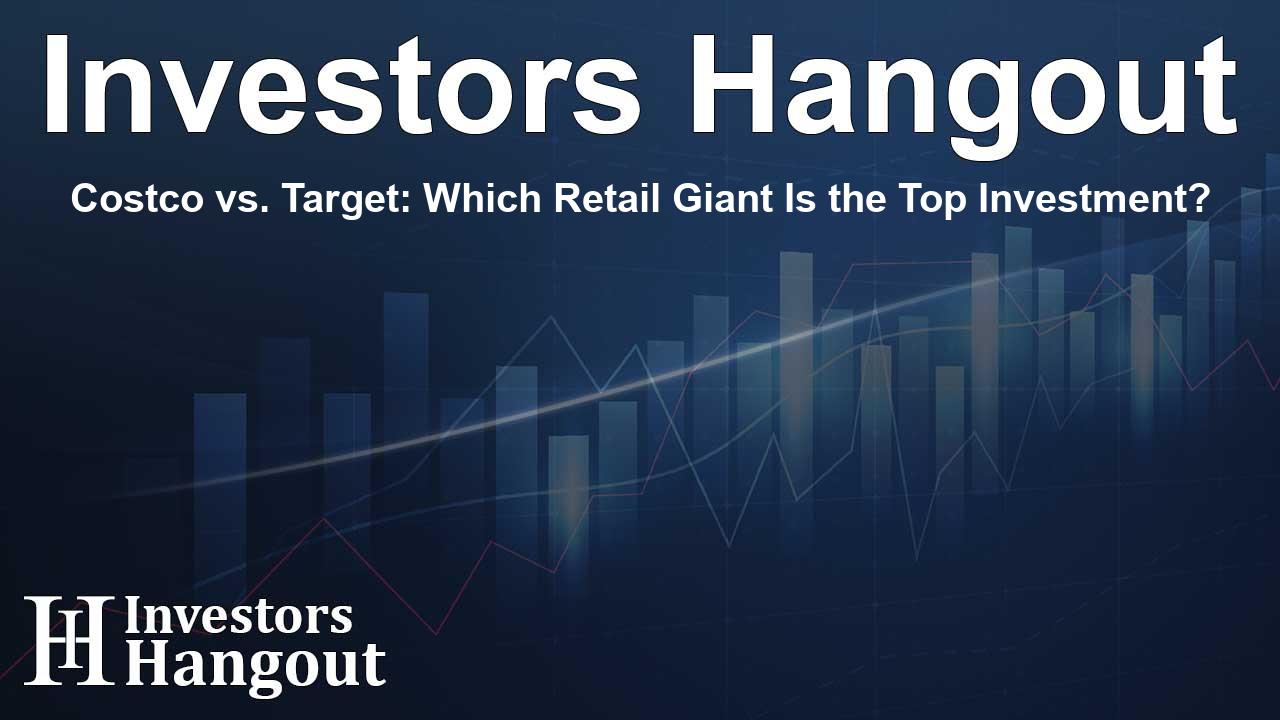Costco vs. Target: Which Retail Giant Is the Top Investment?

Costco vs. Target: A Comparative Analysis of Two Retail Giants
In the world of big box retailers, Costco and Target stand out as two leaders. Recently, Costco shares have surged significantly over the last year, boasting about 63% growth, while Target has achieved a respectable 39% increase during the same period. As both companies demonstrate strong performances, a vital question arises: which stock represents a better opportunity for investors in the upcoming months? Let’s delve into this topic.
Investment Overview
While Costco is respected for its robust returns, showcasing nearly 900% growth over the past decade, its current valuation raises concerns. Conversely, Target, which has exhibited a 224% total return in the past ten years, offers a more attractive investment based on its lower pricing metrics, higher dividend yield, and noteworthy history of consistent dividend growth. Analysts lean towards a more optimistic view of Target's prospects as they consider its potential ahead.
Understanding Valuation Differences
Despite Costco's excellent business model and operational success, its valuation appears quite steep, trading at over 50 times the consensus earnings estimates for 2025. This elevated multiple could restrict growth opportunities if results fall short of investor expectations when the company announces its next earnings report. In contrast, Target’s valuation stands at a much more palatable 14.8 times its forward earnings, placing it significantly lower than Costco’s and below the S&P 500 average.
Moreover, when comparing profit margins, Target excels with gross margins at approximately 26.1%, contrasting sharply with Costco’s 12.5%. This discrepancy in profitability suggests that despite Costco's prestige, Target's financial health provides a more substantial buffer against economic fluctuations. A lower valuation alongside better margins indicates greater upside potential for Target, making it a preferred choice according to some investor perspectives.
Dividend Stocks: An Attractive Feature
Although Costco returns a dividend yield of 0.5%, this return does not hold a candle to Target’s impressive yield of 2.9%. Target also prides itself on an exceptional dividend growth history, maintaining its payments for 55 consecutive years, earning it the status of a Dividend King. This long-term commitment to rewarding shareholders differentiates Target in today's market, where sustainable income streams are highly valued. Both companies are noted for their cautious payout ratios, providing confidence that dividends should remain secure in the future.
Analyst Ratings and Stock Performance
Evaluating analyst sentiments, Costco receives a consensus rating of Strong Buy, signifying confidence from industry experts. However, Target’s consensus rating also leans moderately positive with significant potential upside projected. With an average stock price target for Target indicating approximately 16% growth, the outlook remains favorable.
Smart Score: A Tool for Investors
The TipRanks Smart Score system, which rates stocks based on various market factors, provides an insightful perspective on these companies. Costco scores a commendable nine while Target achieves a perfect ten. This scoring system helps investors identify stocks likely to outperform their peers, further bolstering Target's case as a strategic investment.
Conclusion: Choosing the Right Investment
Ultimately, while Costco has built a solid reputation and continues to generate remarkable returns, its elevated valuation and limited margin for error may present challenges moving forward. On the other hand, Target's more attractive pricing, higher dividend yield, and long-standing commitment to dividend growth make it the more appealing investment choice at this time. As such, Target appears to be on a strong trajectory, promising upward movement for current and prospective investors.
Frequently Asked Questions
What are the growth rates for Costco and Target shares?
Costco has seen approximately 63% growth over the last year, while Target has shown about 39% growth during the same period.
Why is Target considered a good investment?
Target stands out due to its lower valuation, higher dividend yield, and a commendable history of consistent dividend growth.
How do the dividends of Costco and Target compare?
Costco offers a yield of 0.5%, while Target boasts a significantly higher yield of 2.9%, demonstrating Target's strength in rewarding shareholders.
What is the outlook for Target according to analysts?
Analysts remain optimistic about Target, projecting a notable potential upside based on its average stock price targets.
How does the Smart Score apply to Costco and Target?
The Smart Score system rates Costco at nine and Target at a perfect ten, suggesting Target may outperform in the market.
About The Author
Contact Addison Perry privately here. Or send an email with ATTN: Addison Perry as the subject to contact@investorshangout.com.
About Investors Hangout
Investors Hangout is a leading online stock forum for financial discussion and learning, offering a wide range of free tools and resources. It draws in traders of all levels, who exchange market knowledge, investigate trading tactics, and keep an eye on industry developments in real time. Featuring financial articles, stock message boards, quotes, charts, company profiles, and live news updates. Through cooperative learning and a wealth of informational resources, it helps users from novices creating their first portfolios to experts honing their techniques. Join Investors Hangout today: https://investorshangout.com/
The content of this article is based on factual, publicly available information and does not represent legal, financial, or investment advice. Investors Hangout does not offer financial advice, and the author is not a licensed financial advisor. Consult a qualified advisor before making any financial or investment decisions based on this article. This article should not be considered advice to purchase, sell, or hold any securities or other investments. If any of the material provided here is inaccurate, please contact us for corrections.
